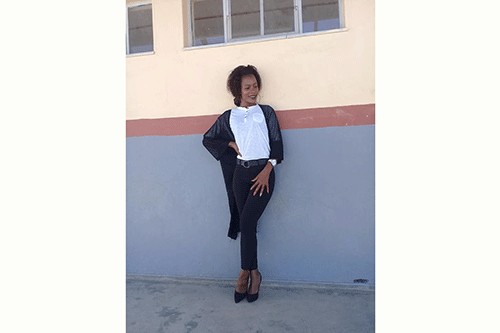Erongo teacher makes a difference
“Teachers teach because they care. Teaching young people is what they do best. It requires long hours, patience and care.” The father of public school Horace Mann stated this during the 19th century about public school teachers like Biola Vaanda Tjizake.
She is a grade 3 teacher at Okongue Primary School in the Dâures constituency in the Erongo region.
Her compassion for the young ones drove her to pen a Mathematics booklet, written in simplified form, to help grade 1 learners grasp the subject.
“The math booklet was meant to keep learners busy during the winter holiday to keep them off the streets as well so that when they return to school, they’ll not be far too behind,” she said.
Tjizake always wanted to be a teacher. She recalled how “for some reason, I always wanted to be a teacher when we were young; my sisters and I would play school games and I was always the teacher”.
She realised her dream of becoming a teacher after enrolling for a certificate and diploma in Early Childhood Development with the Namibia College of Open Learning. She is currently in her final year of studies at the University of Namibia.
In 2014, she taught at Ongongo Primary School in the Kunene region before joining Okongue in 2015.
“I teach grade 3; I coach our school netball team. Also, I’m part of the counselling and support group – to name but a few,” she said.
“The thing I love most about this profession is my learners. I love interacting with them – learning from them; I love how they look up to me,” she said about her love for teaching.
Despite her love for teaching, Tjizake has admitted that being a public school teacher, working in a rural area, comes with many challenges.
She pointed out the chronic lack of resources and parental support for the learner as the biggest challenges.
“Teaching in a rural area has challenges of its own. Learners do not do their homework because parents have little knowledge, as most live with grandparents who can’t read and write. And most of our learners live in the hostel; therefore, they have no one to help them with their work. Sometimes, learners would get homework, where they need to search the Internet for information but they do not have access to computers. Also, our learners struggle with reading; I think this is because we have no library,” Tjizake noted.
Apart from the challenges facing public school teachers, Tjizake praised them as unsung heroes of the Namibian education system.
“I’m sitting with grade 3 learners who are at the grade 2 level. Therefore, I come back in the afternoons to try and push those that are behind; I come back on weekends again. We spend our nights marking, preparing for the next lesson and setting question papers.
I’m always begging parents to return learners to school; sometimes, you’ll have to teach January’s work in March just because two learners were not brought back to school on time.
“And we’re always motivating learners to work hard; we deal with difficult learners and parents because we’re teachers. Everyone thinks a teacher’s job is easy until they have to do it themselves. Parents wonder how we manage a class with 30-plus learners when they couldn’t even homeschool one child. Teachers give birth to all other professions,” she said.
She further lamented that public school teachers are “are not being celebrated enough” while rejecting the assertion that they are chronically inefficient.
“I believe we work as hard as our colleagues in the private sector. The only difference is that I’ll be sitting with 36 grade 3 learners while they can have eight learners.”
She added that “It is much easier to teach a small group of learners; they’re not so many – there will be no disturbances, and it will be much easier to give special attention to the few who do not understand”.
Another thing is that parents whose learners go to private schools have the means to, for instance, buy textbooks, Ipads or any other resources needed to deliver quality education, compared to those whose children go to public schools. We’re just as productive; we try our best with the little we have. And our learners make it to universities too – and they do just as good,” she said in defence of her colleagues in public education.
Tjizake is weary of the school disruption by the Covid-19 pandemic.
“I just hope things will go back to normal because this thing of automatically promoting learners to the next grade is disadvantageous to them. In the coming years, we will be sitting with a grade 5th or 7th that can’t read or write,” she said.
On top of her list, Tjizake wishes for a situation where teachers from different schools and regions “work together by helping or giving one another ideas on how to give productive lessons, how to assist learners to read, and how to change the learners’ mindset about math. It would be nice if we can even visit one another’s schools.”


